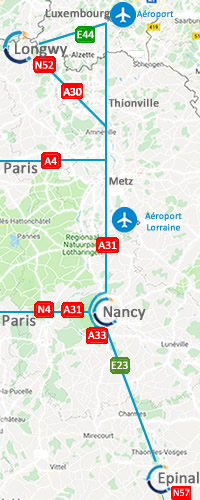Tushar JAIN, Alumni Doctor 2012, from the Lorraine to India
Tushar JAIN, doctor in Automatics, Signal processing and Computer engineering of Université de Lorraine did his thesis in 2012 at CRAN. He shared his reasons for choosing to work abroad and then return to india, his original country, while maintaining contact and collaborations with Université de Lorraine
To start, tell us about your background at the Université de Lorraine and how you arrived in France?
I did my Master of Technology degree in Control and Guidance from the Indian Institute of Technology (IIT) Roorkee, India, in 2009. During the final months at IIT Roorkee, I was highly motivated to continue my career path as a researcher. To have international exposure to my research career, I started applying to a couple of selected universities based on the research problems in the area of control systems. My application for Ph.D. studies was accepted in Swinburne Institute of Technology, Australia, University of Kent, UK, University of Pretoria, South Africa, and Université Henri Poincaré, France. I was not entirely sure at that time which university to choose for my higher studies. To know more about my background and experience, I received a phone call from Prof. Dominique Sauter and Prof. Joseph Yamé, who proposed the thesis topic. After interacting with them, I finally chose to work with them in the laboratory CRAN.
My thesis was financed by the French Ministry of Higher Education and Research, which I defended in 2012. Since I did not know anyone there before my arrival, they had helped me immensely with the paperwork before my arrival and settled me down in the initial days on my arrival, particularly with the accommodation since I was not much comfortable in the French language. I am highly thankful to them for their initial gesture. Nevertheless, the other members of CRAN also welcomed me and interacted with me in the English language to make my stay comfortable in the lab.
After your Ph.D. graduation, what positions have you held until now? and why did you choose Finland and later your country?
During my Ph.D. studies at CRAN, Prof. Sauter invited Prof. Sirkka-Liisa Jamsa-Jounela from Aalto University, Finland, to deliver a course on process control, which appeared very interesting to me. Also, interacting with several other researchers in international conferences, I started aligning more towards the research. The training I received from my supervisors concretized my decision to choose the research path either in academia or in some research division in companies. After submitting my thesis, Prof. Sauter recommended my name to Prof. Jamsa-Jounela for the post-doc position in her lab. Also, my Ph.D. studies address the theoretical problems, and since the post-doc position was a part of the newly granted EU project, this opportunity gave me to work both in academia and in collaboration with an industrial partner in the UK. I have had a long-term goal to go back to the IIT system in India, so I have to return to India anytime sooner or later. Subsequently, I joined IIT Mandi as a permanent faculty member in July 2015.
You worked in Finland: what did you gain from this experience? (Does the Finnish system benefit researchers compared to the French system? in terms of salaries, responsibility, career development, etc.)?
I felt the environment with the research lab is the same in France and Finland in terms of research activities. There is a slight difference outside the lab since many people speak English there in Finland. I must thank Prof. Sauter, who motivated me to take and arrange French classes, which improved my language skills. But due to my other commitments, I could not reach that level where I can take some courses for UL students. However, there were no such restrictions at Aalto University. I partially taught a couple of courses to post-graduate students in Aalto. Also, I got the opportunity to submit my research proposal to the prestigious Academy of Finland, in which I was successful. I guided a Master thesis at Aalto. So all these academic responsibilities, the exposure, and opportunities I received in Finland have indeed made me a more independent researcher.
You have been in touch with the CRAN laboratory in Nancy. Could you give some examples of collaboration? How could this collaboration with the University of Lorraine help develop training and research within your institute in India?
Since I completed my Ph.D. studies at CRAN, I have been in constant touch with my supervisors. We finished a couple of pending research papers during my post-doc with Prof. Sauter and Prof. Yamé. After joining IIT Mandi, they invited me to the lab to finish writing the book, which was later published in Springer. Prof. Yamé and I have guided a Ph.D. student who graduated from IIT Mandi in 2021 and now working with Mercedes-Benz, India. Apart from this academic collaboration, we are in regular touch on personal terms. Seeing my career path, I can indeed say that the research or academic collaboration between IIT Mandi and the University of Lorraine will undoubtedly be helpful in terms of
- writing joint research proposals to submit to CEFIPRA or other funding agencies,
- guiding research scholars at master and Ph.D. level so that students may have research exposure in both countries,
- exchange of students for internships so that they can be further motivated to choose their career path,
- organizing some French classes by UL for IIT Mandi students either in online or offline mode for which some course credits can also be given,
- faculty exchange programs
On behalf of IIT Mandi, I would be happy to take initiatives in this direction.
For more details about the skills of Tusha Jain, please connect on the Alumni directory !






